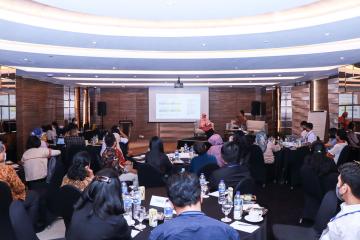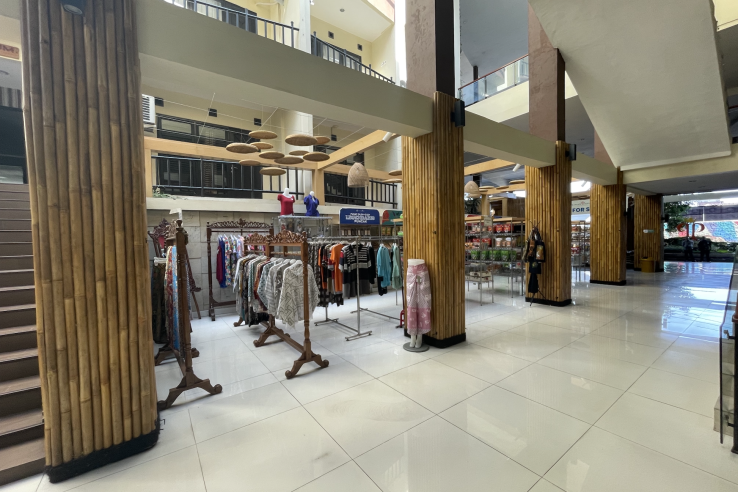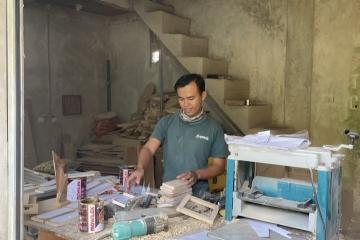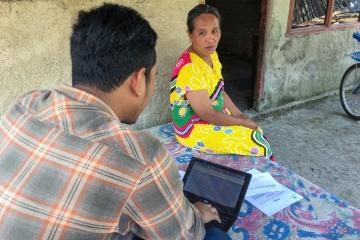
Can product curation overcome challenges in MSME market expansion? Opportunities for impact evaluation

In a competitive economy like Indonesia’s, it can be hard for small businesses to survive and expand. Since the Covid-19 pandemic more sellers have entered online markets, making it even more challenging for small businesses to set themselves apart.
Research by J-PAL affiliated professor Bai et al. (2020) suggested that this surge can create market congestion, impacting the distribution of demand within the market. Moreover, lack of information limits consumers’ ability to find products, posing a challenge for new businesses to stand out.
While the Government of Indonesia has prioritized initiatives to support the growth of micro, small, and medium-sized enterprises (MSMEs), including by allocating IDR 62 billion in 2023 (USD 3.8 million) through the Ministry of Cooperation and SMEs to support MSMEs, many still struggle to expand their market share.
Insights from a recent Learning Collaborative event hosted by J-PAL Southeast Asia (SEA) and the Directorate of MSME and Cooperative Development of Indonesia’s Ministry of National Development Planning (Bappenas) shed light on evidence and insights on the most effective approaches to support MSMEs in a congested market.
At the event, Budi Primawan, Vice President of Lazada Indonesia, one of the largest e-commerce platforms in Indonesia, highlighted that simply onboarding MSMEs onto e-commerce platforms is not a one-size-fits-all answer. Tailoring support with each firm's market profile becomes crucial.
One potential solution is through product curation to help businesses (what we refer to as “firms”) narrow down and target their products to relevant markets. This process involves selecting and scoring MSME products based on their business and product value, and ultimately helping them make connections to suitable markets. While this is a promising approach for better market allocation, limited rigorous evidence on its effectiveness and impact on firms' overall business outcomes necessitates further research.
To delve deeper into the concept of product curation, we engaged with Rumah Kurasi, a private institution specializing in curating MSMEs, and Smesco, a government agency under the Ministry of Cooperative and SMEs which focuses on marketing MSME products. These engagements provided valuable insights into the practical aspects of product curation and strategies to support MSME market expansion.
The effectiveness of product curation hinges on the selection criteria and mechanisms, which may lead to varying results
Organizations can adopt various approaches to curating MSME products. For example, Rumah Kurasi examines firms’ legal documents, evaluates the durability and marketability of their product and packaging, and assesses profitability and owner’s industry knowledge when determining firms’ target markets. A study by McKenzie and Sansone (2019) on business competition in Nigeria underscored the potential benefit for curators to incorporate the owner's background into selection processes. Findings suggested that a simple predictive economic model incorporating an owner’s key characteristics and abilities can offer better insights into a firm's potential than judges' scores on business plans alone.
While well-defined selection criteria are crucial, their effectiveness depends on implementation. For instance, Rumah Kurasi conducts interviews, product inspections, and company visits to assess both product quality and market suitability. To do so, Rumah Kurasi trains and certifies curators, ensuring a standardized ability to select and score firms. This emphasis on in-person evaluation aligns with McKenzie and Sansone (2019)’s study in Ghana, which suggested that live interviews may allow judges to pick up signals in understanding a firm's potential, which may add predictive power to surveys and paper application.
These insights underscore the need for further research to understand the effectiveness of various selection criteria and mechanisms used to curate MSMEs and their markets. Furthermore, since the curation process may unintentionally exclude smaller firms, evaluations should explore why these firms were not selected. This evidence can guide policymakers and program owners in better supporting lower-tier firms by identifying their shortcomings and helping them refine business strategies and management practices, ultimately leading to increased product value.
Market expansion support can also help firms reach suitable markets, but impacts may differ depending on the firm’s characteristics
The next pivotal question in the curation process is how to enhance a firm's overall business outcomes after product curation is completed. Common approaches include facilitation through exhibitions, business-matching, and trading houses. For example, Smesco assists MSMEs by supporting domestic and international exhibitions annually. To do so, Smesco curates products that fit with the targeted market and then provides a platform and assistance to MSMEs to showcase their product.
A quasi-experimental evaluation by Munch and Schaur (2018) in Denmark suggested that connecting firms to potential partners through business matching led to increased export performance, higher value-added, and enhanced productivity. This trend is particularly pronounced among small firms, where the cost of connecting to existing networks is lower than establishing their own business network. Similarly, an evaluation by J-PAL affiliated professors Atkin, Khandelwal, and Osman (2017) found that creating an export demand for SMEs that have been trained to meet the export qualification can increase productivity and long-term revenue.
The insights above indicate the diverse outcomes from different types of market expansion support. To improve effectiveness, program providers should explore innovative impact evaluations in the context of Indonesian MSMEs. Findings from the evaluations can offer evidence to guide policymakers and program owners on cost-effectiveness and how to yield a long-term program impact for MSMEs.
Ways forward: Opportunities for impact evaluation
Product curation has the potential to address challenges in market allocation within a competitive environment. However, there is limited evidence of its effectiveness, especially in Indonesia. Further research can help guide policymakers and program owners in increasing the effectiveness of the curation process.
J-PAL SEA’s Innovation for MSME Development Initiative (IMDI) funds policy-relevant research and promotes knowledge-sharing among practitioners and policymakers who champion the use of rigorous evidence in the MSME sector. Open questions include:
Criteria and mechanisms of selection
- What criteria and indicators are most effective for assessing the quality of products and firms with varying backgrounds? Can we tailor the selection criteria according to firms’ sectors and sizes?
- What qualifications should a curator have to effectively judge and score products?
- What is the difference between employing certified (trained) curators and industry experts?
Types of market expansion support
- How can we maximize the impact and cost-effectiveness of demand-side market expansion support for firms (e.g., business matching, fair trade, exhibitions, etc.)?
- As exhibitions are the most common way for the government to support MSMEs in meeting new markets, what are the key characteristics of firms that can successfully maximize this support?
Curation added-value
- What is the impact and added value of being curated on firms' business outcomes?
- Is there a difference in consumers’ satisfaction when they buy curated products vs. uncurated products?
- How can product curation help the government and policymakers map out MSMEs' strengths?
The IMDI team is open to discussing existing evidence, policy lessons, and potential research questions and brainstorming ideas to advance MSME growth. To get involved, reach out to Rizka Diandra Firdaus (Policy and Communications Manager).
Related Content

Accelerating financial inclusion in Indonesia through innovations in digital financial services: Early learnings from exploratory and pilot studies

Using alternative data and artificial intelligence to expand financial inclusion: Evidence-based insights

